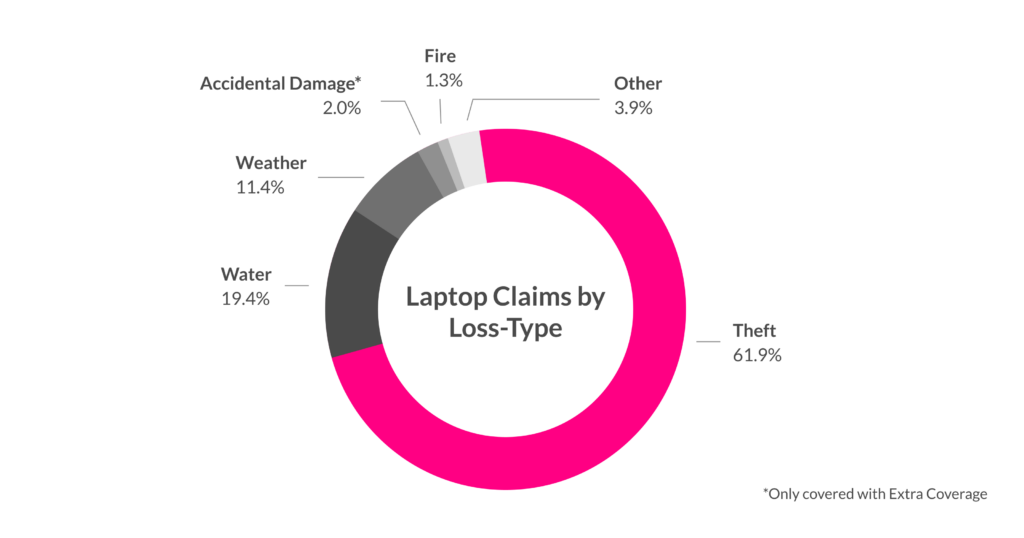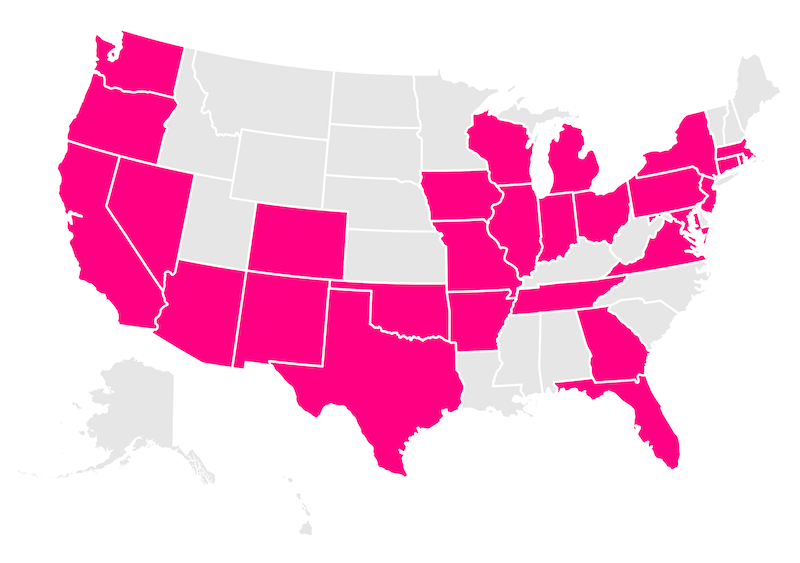A laptop is stolen every 53 seconds, according to the research firm Gartner, so protecting yours should be at the top of your list of reasons to get renters or homeowners insurance. And yet, you may assume your warranty covers your favorite device. Should you care that your warranty doesn’t include theft? It’s not like theft is going to happen to you, right? Don’t wait until your laptop is swiped to realize you wanted insurance all along.

Is it worth getting laptop insurance for things like hardware damage? What about water damage? Will a manufacturer’s warranty cover laptop theft?
Here are the answers to your biggest questions about laptop insurance.
1. What kind of insurance do I need for a laptop?
Here’s some good news: renter’s insurance and homeowners insurance cover your laptop, and everything else you own. So your laptop is covered for the ‘perils’ listed in your policy: that’s insurance-speak for bad things that could happen, like vandalism, theft, and fire. That means if your laptop is swiped from a cafe, or while you’re traveling abroad, you’re in luck: your home insurance covers you. Here’s a list of ‘perils’ covered by homeowners and renters insurance:

So, if lightning strikes or a volcano erupts, your laptop is safe, which is a huge relief since you want to protect one of the most valuable items you own. (Eager to get covered? Top right corner!)
You will, however, need to pay your deductible as part of the claims payout for your laptop. For many of your valuables, like engagement rings and bicycles, you can add what’s called Extra Coverage. Also known as scheduled personal property, this add-on covers everything listed on your base policy, plus additional types of accidental damage. This, unfortunately, doesn’t hold true for laptops.
That’s because electronic items (like laptops) are more prone to accidental damage than a diamond ring, and since scheduled items are covered for physical damage, insurance companies would need to cover 100% of scratches and dents.
2. Does my laptop’s warranty count as insurance?
Your computer probably came with some kind of manufacturer warranty or guarantee for its first year. Things like defective keyboards, hard drive failures, and other issues caused by faults in the product are usually covered by this warranty.
But if you’re left with a cracked when your roommate steps on your laptop, your warranty won’t cover it – and neither will your home insurance. That’s because accidental damage is usually considered ‘negligence’ (you shouldn’t have left it on the floor).
Still, you’ll want to check the details of both your warranty and insurance policy.
Let’s say you’re a Mac user (after all, Mac is the Lemonade Makers’ weapon of choice). Any Macbook includes a limited warranty that offers a year of ‘hardware repair coverage’ and 90 days of technical support. But Apple also offers a premium protection plan.
A new MacBook Pro 13-inch is eligible for AppleCare+ within 60 days of purchasing for $249. This addition includes three years of coverage for unlimited incidents of accidental damage (for screen damage or external enclosure damage, each subject to a service fees of $99), other incidents of accidental damage for $299, and 24/7 access to chat or talk with an Apple expert. For additional info, check out this link.
But, the plan is expensive, subject to high fees, and doesn’t cover theft. Bradley Chambers, a blogger at 9to5Mac, compares the investment in AppleCare+ to his investment in life insurance and deems the add-on a poor choice.
“Here’s why I don’t buy AppleCare: Statistically, you won’t need it. Apple only sells AppleCare because people will buy it, and it’s virtually free money for them.”
Popular PC laptop manufacturers such as HP, Lenovo, Dell, Acer, and Asus have a similar limited warranty to Mac. These companies typically offer a yearlong warranty, which covers repairing or replacing defective hardware. Basically, if your laptop is a lemon, the laptop company has you covered, but if anything bad happens to your laptop out in the wild, you’ll need some more coverage.
In 2022, a whopping 61.9 percent of laptop claims handled by Lemonade were theft-related. So while a manufacturer warranty may protect your laptop from damage, even the premium protection programs won’t cover you for the all-too-common likelihood of theft.
Lemonade renters policies start at $5 a month, so when deciding the best way to protect your laptop from these most common perils, keep in mind what it costs to protect it, and what losses and damages are covered.

3. What if my laptop is a work computer?
Your policy covers items you own or use, so if your work laptop is stolen would your Lemonade policy cover it? Possibly. It depends on whether or not your company holds you financially responsible for the laptop.
If your employer requires you to pay up, Lemonade could have your back. If your company covers the cost to replace the laptop, chances are they’re filing a claim with their own policy, and there’s no reason for you to do the same.
A few months ago, a Lemonader in Brooklyn (let’s call him Justin) had his backpack swiped while perusing the aisles at Trader Joe’s. Lemonade reimbursed him for his Apple watch, sunglasses, and backpack, but his laptop was replaced by his employer.
What if Justin was a freelance graphic designer using his own equipment for his full-time job? Well, Lemonade would reimburse him up to a sublimit, which is the maximum amount your insurance company will cover for a certain type of loss. In the case of professional equipment, it’s $1,500.
Now, what if Justin was a professional graphic designer who occasionally used his personal computer for work projects? This would likely be covered without applying a sublimit since it’s only applied to items ‘primarily used for business purposes.’
4. My laptop was destroyed, is it covered?
Great question, but the answer is complicated. Like we mentioned before, accidental damage usually gets chalked up to negligence, so if you’re seeking coverage for a damaged laptop, everything will depend on how your device was damaged.
If you spill water across your keyboard and the whole thing stops working, you can expect a disappointing response from your insurance company. On the other hand, damages that are included in your policy (see above ‘perils’ for a refresher) would mean your laptop is eligible for reimbursement. So if a burst pipe damages everything in your living room (laptop included) it will be covered.

Believe it or not, if you spill water on your friend’s laptop your policy could cover their computer. Your renters insurance liability coverage might kick in if you negligently damage someone else’s laptop you’re borrowing. But, note, it would still be considered a chargeable loss, so your insurance premium may go up. This will obviously depend on the situation (so try not to spill).
5. Lemonade Renters or Homeowners insurance for your laptop
If you decide to protect your laptop (and the rest of your stuff) with renters or home insurance, getting a policy with Lemonade is easy!
All you need to do is get a basic insurance policy, which takes less than 2 minutes: Download the Lemonade app, answer a few questions about your home, and get insured in seconds.
To make sure you’re getting enough coverage for your computer (and everything else), double-check your ‘personal property coverage’ (insurance-speak for coverage for your stuff) is sufficient. Otherwise, you could be left high and dry when disaster strikes. Many state insurance regulations (all but New York and California) include an ‘Electronics Limit of Liability.’ Best to add the electronics endorsement, which expands your coverage up to your contents limit.
Here’s how to estimate the value of your stuff:
1. Take 2 minutes, walk around your apartment, and take a video (or pics) of everything you care about
2. Make a list of the stuff you just filmed/snapped and estimate how much each item costs
– If you have receipts, keep a pic in case you ever have to replace the stuff under warranty or have to make a claim
– For electronics and more expensive items, it’s important to know the make and model as well as when and where you bought them
3. For shoes, non-electronic kitchen items, and other stuff in bulk, just estimate what it would cost all together
4. Add this up and voilà, that’s the value of your stuff (i.e. how much personal property coverage you’ll need)
Best practice is rounding up to the nearest $10K. So if your laptop ($1,250), phone ($1,000), bike ($1,000), furniture ($5,000), and clothing ($7,000) add up to $15,250, you’ll want to get at least $20k in personal property coverage.
If you have any additional questions about laptop insurance coverage, feel free to check out our FAQs, and if you’re ready, go ahead and take Lemonade for a spin – it’ll take you less time than restarting your laptop.
Which states currently offer renters insurance?

Arizona, Arkansas, California, Colorado, Connecticut, Florida, Georgia, Illinois, Indiana, Iowa, Maryland, Massachusetts, Michigan, Missouri, Nevada, New Jersey, New Mexico, New York, Ohio, Oklahoma, Oregon, Pennsylvania, Rhode Island, Tennessee, Texas, Utah, Virginia, Washington, Washington, D.C. (not a state… yet), and Wisconsin.
FAQs
Does renters insurance cover laptops?
Yes, renters insurance usually covers your laptop for specific perils—like if it gets damaged or stolen. Keep in mind: Renters insurance typically works on a reimbursement basis, and you’ll need to pay your deductible as part of the claims process.
Is it worth claiming for a laptop on renters insurance?
It depends on the value of your laptop and your deductible. If repairing or replacing your laptop costs significantly more than your deductible, it might be worth filing a claim. On the flip side, if your laptop is old and has some signs of wear, and you have a high deductible, it might not be worth pursuing a claim. Keep in mind: Frequent claims can lead to higher premiums.
Are laptops covered if stolen from my car?
Yes, if your laptop is stolen from your car, it is usually covered under your renters insurance policy, as long as theft is a covered peril. Additionally, Lemonade offers a car and renters insurance bundle, which could come in handy in situations like this (not to mention the sweet discounts you could be eligible for). For example, if a thief smashes your car window to steal your laptop, the laptop would be covered under renters insurance, but the car window repair would have to fall under your car insurance policy.
How does renters insurance handle data recovery costs if my laptop is damaged or stolen?
Renters insurance usually doesn’t cover data recovery costs if your laptop is damaged or stolen. While your policy might help with replacing or repairing the laptop itself, you’ll need to tackle data recovery on your own. For safeguarding your valuable data, consider exploring data protection services—like Backblaze, Carbonite, or Crashplan.
A few quick words, because we <3 our lawyers: This post is general in nature, and any statement in it doesn’t alter the terms, conditions, exclusions, or limitations of policies issued by Lemonade, which differ according to your state of residence. You’re encouraged to discuss your specific circumstances with your own professional advisors. The purpose of this post is merely to provide you with info and insights you can use to make such discussions more productive! Naturally, all comments by, or references to, third parties represent their own views, and Lemonade assumes no responsibility for them. Coverage and discounts may not be available in all states.




